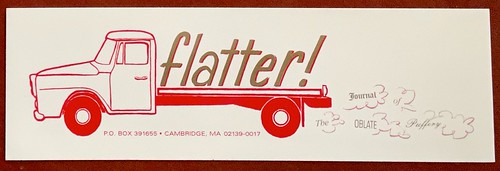Says Ken Jennings, quoted in "Ken Jennings Has Some Questions About Death/The 'Jeopardy!' host on the meaning of trivia, the awkwardness of personal anecdotes, and his new book—a travel guide to the afterlife" (The New Yorker).
৮ জুন, ২০২৩
"Well, the funny thing is he can’t imagine any celebrities bigger than, like, people from northern Italy at the time. "
Says Ken Jennings, quoted in "Ken Jennings Has Some Questions About Death/The 'Jeopardy!' host on the meaning of trivia, the awkwardness of personal anecdotes, and his new book—a travel guide to the afterlife" (The New Yorker).
২৯ জানুয়ারী, ২০২৩
"Flattery (also called adulation or blandishment) is the act of giving excessive compliments..."

৬ মে, ২০২২
This is a reference to "The Inferno" — to the 9th Circle of Hell — right?
It’s impossible to overstate the earthquake this will cause inside the Court, in terms of the destruction of trust among the Justices and staff. This leak is the gravest, most unforgivable sin.
— SCOTUSblog (@SCOTUSblog) May 3, 2022
I thought "the gravest, most unforgivable sin" was an absurd overstatement. I can think of far more horrible sins. Murder springs to mind first. Mass murder. Torture murder. And so on.
But I realized, no, in Dante's "Inferno," the lowest circle of hell is not for murder. It's for treachery:
Trapped in the ice, each according to his guilt, are punished sinners guilty of treachery against those with whom they had special relationships. The lake of ice is divided into four concentric rings (or "rounds") of traitors corresponding, in order of seriousness, to betrayal of family ties, betrayal of community ties, betrayal of guests, and betrayal of lords. This is in contrast to the popular image of Hell as fiery; as Ciardi writes, "The treacheries of these souls were denials of love (which is God) and of all human warmth. Only the remorseless dead center of the ice will serve to express their natures. As they denied God's love, so are they furthest removed from the light and warmth of His Sun. As they denied all human ties, so are they bound only by the unyielding ice." This final, deepest level of hell is reserved for traitors, betrayers and oathbreakers (its most famous inmate is Judas Iscariot).

৬ অক্টোবর, ২০২১
"Who would be a muse, eh? Loads of people, that’s the thing. Dante wrote about his childhood crush Beatrice di Folco Portinari in The Divine Comedy."
So... Dawn donates a kidney for whatever reason, I mean who cares? Then posts about it, then gets involved in a more pub[l]ic way, and... a bunch of writers secretly deride her (why, exactly? Guilt they aren't doing enough? Just plain pettiness?). Then one of those writers, Larson, uses the feelings she feels about this kidney donation to craft a story, using Dawn's actual words, never telling her, and then Larson has the gall to use racism as a defense? As a BIPOC artist, I take offense to Larson's re-characterization of what she, in fact, did - steal, plagiarize, and - while not illegal - Larson's ruthless backstabbing of someone she found ridiculous. It makes it harder for artists of color to cite racism when it actually occurs What was happening to Larson during her "summer of hell" and beyond was the result of her own lack of integrity and dishonesty and, yes, I'll say it, entitlement.
ADDED: Yes, there's a racial theme in the NYT article — which now sounds "punishing" in more ways than just length.
“My piece is fiction,” [Larson] wrote. “It is not her story, and my letter is not her letter. And she shouldn’t want it to be. She shouldn’t want to be associated with my story’s portrayal and critique of white-savior dynamics. But her recent behavior, ironically, is exhibiting the very blindness I’m writing about, as she demands explicit identification in — and credit for — a writer of color’s work.”
Here was a new argument, for sure. Larson [the POC writer] was accusing Dorland [the white organ donor] of perverting the true meaning of the story — making it all about her, and not race and privilege. Larson’s friend Celeste Ng agrees, at least in part, that the conflict seemed racially coded. “There’s very little emphasis on what this must be like for [Larson],” Ng told me, “and what it is like for writers of color, generally — to write a story and then be told by a white writer, ‘Actually, you owe that to me.’”
২ জানুয়ারী, ২০২১
"Eighty-eight rarely seen drawings of Dante’s The Divine Comedy have been put on virtual display as Italy begins a year-long calendar of events to mark the 700th anniversary of the poet’s death."
১২ ডিসেম্বর, ২০২০
"If you can’t annoy somebody … there’s little point in writing" —Kingsley Amis/"Whatever they criticize you for, intensify it" —Jean Cocteau.
১৩ নভেম্বর, ২০১৯
"Looking around lately, I am reminded less often of Gibson’s cyberpunk future than of J.R.R. Tolkien’s fantastical past, less of technology and cybernetics than of magic and apocalypse."
From "In 2029, the Internet Will Make Us Act Like Medieval Peasants" by Max Read (in New York Magazine).
Simonists, eh? Hint: They're in the 8th Circle of Hell. Looks like this:





